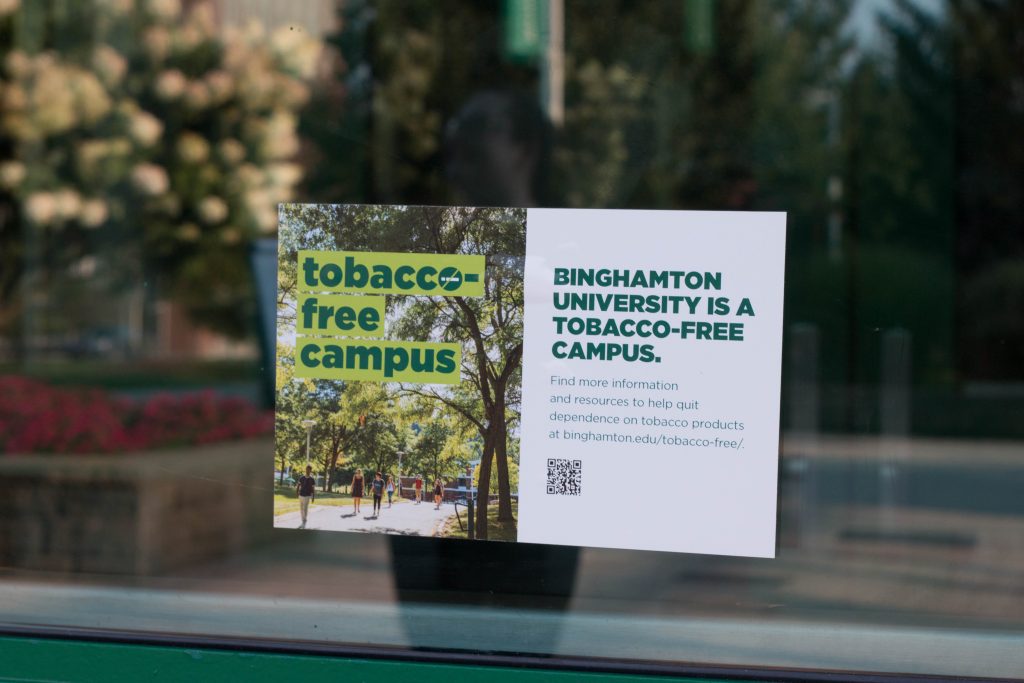
Students returning to campus this semester may have noticed fewer clouds of smoke on Binghamton University’s campus.
BU’s new tobacco-free policy, implemented Aug. 1, forbids the use of any tobacco product, including cigarettes, e-cigarettes, cigars, hookah and chewing tobacco on any property owned or operated by the University.
The “Tobacco-Free Campus Management Procedure,” the policy issued by BU’s Office of the Vice President of Operations as well as the Environmental Health and Safety Office, places the responsibility to uphold the ban on the entire campus community, including students, visitors, employees and Binghamton’s New York State University Police.
According to JoAnn Navarro, vice president for operations at BU, the procedure treats violations as disciplinary issues rather than criminal ones, referring employees and students who violate it to Human Resources and the Dean of Students Office, respectively.
“When we are made aware [of violations], we are working on a case-by-case basis to help educate people about the policy and what it means,” Navarro said. “So far, we are extremely pleased with the cooperation across campus in abiding by the policy.”
The switch has been met with mixed reactions from students.
Jessica Alfaro, a senior double-majoring in history and sociology, said although she is not a smoker, she thinks a campus-wide ban is not realistic.
“I have noticed fewer people smoking [on campus], outside the library especially, since I’ve been back this semester,” Alfaro said. “But in the long run, I don’t think a ban is sustainable. A tobacco-free campus doesn’t encourage people to quit — it only makes them want to hide it.”
In an effort to help ease the University into the new policy, the Healthy Practices Clinic was launched last spring. The clinic is staffed by nurse practitioners and undergraduate nursing students from the Decker School of Nursing and is associated with their Interdisciplinary Tobacco Use Research Program.
When a patient first arrives at the clinic, their health history is taken by the staff, followed by an evaluation of their general health. After a consultation, the staff recommends personalized nicotine replacement therapy, consisting of U.S. Food and Drug Administration-approved tobacco nicotine replacement products like gum, patches and lozenges, followed by cessation counseling, which treats tobacco use as an addiction and attempts to educate patients on its dangers.
Colin Talvi, a junior majoring in psychology, said he made the switch from cigarettes to a nicotine vaporizer. Vaporizers are classified as an electronic nicotine delivery system, which is labeled by the FDA as a tobacco product and prohibited under the ban. Talvi said he is adhering to the new policy, but hasn’t noticed the same from his fellow student and employees.
“I respect and understand the concerns of students and faculty and why the ban was implemented,” Talvi said. “Since the start of this semester, I have witnessed many students and University employees outright ignore the ban. If certain areas were designated [for] smoking, smokers would have a place to go and nonsmokers could easily avoid the areas.”
Geraldine Britton, assistant professor of nursing and the director of the Interdisciplinary Tobacco Use Research Program, said in the short time the clinic has been open to the public, patients have consisted mainly of University employees and staff. However, the office is actively trying to inform the entire University community of the resources offered.
“In the past month, we have attended several employees fairs, as well as the welcome event for international students at which we assessed blood pressures, pulse and oxygen levels and provided tobacco use information to about 100 employees,” Britton said. “We are in the process of developing a ‘road show,’ where we will be providing these services at central sites around campus for employees and contractors, such as Sodexo.”
Britton said the program has already resulted in at least one participant curbing their tobacco addiction.
“One success story stems from focus groups of smokers we conducted in the spring on campus to generate ideas for the clinic,” Britton said. “A week after a focus group was held, we heard that one of the participants was motivated to quit by the group discussion and by the impending tobacco-free policy and has been smoke-free ever since.”
The Healthy Practices Clinic is located in Academic Building B Room 331 and operates by appointment on Mondays and Thursdays from 11 a.m. to 2 p.m. Walk-in service is available from 10 a.m. to 11 a.m. on those days. All services are free of charge and funded by the Decker School of Nursing, Student Health Services and the Tobacco-Free Campus Initiative.


